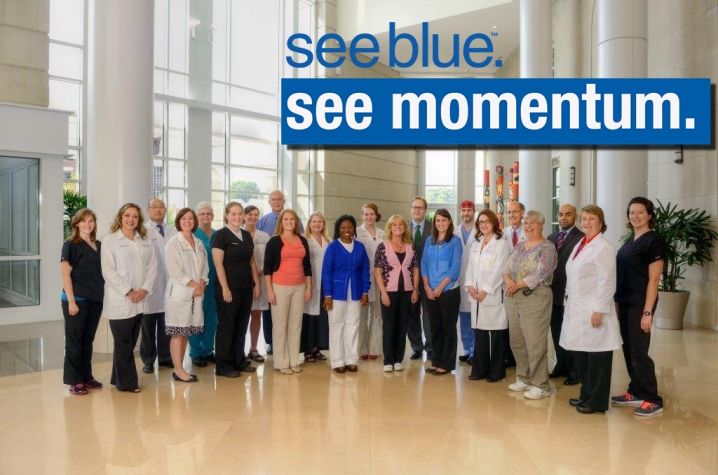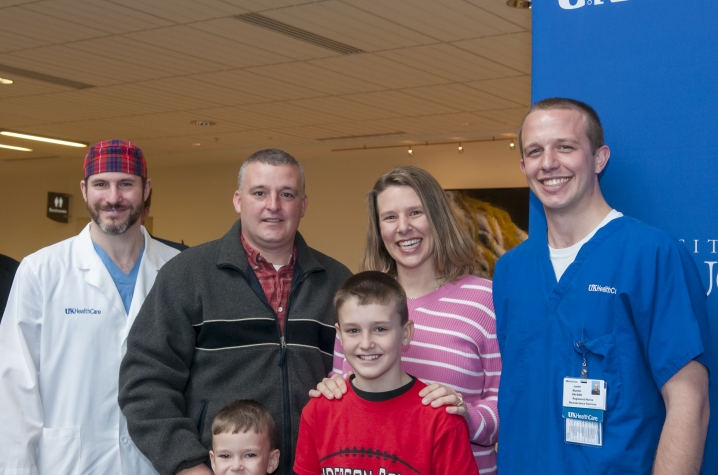UK HealthCare Designated a Comprehensive Stroke Center by The Joint Commission
[youtube]
LEXINGTON, Ky. (Feb. 18, 2014) -- UK HealthCare has been designated a Comprehensive Stroke Center by The Joint Commission (TJC) and the American Heart Association/American Stroke Association.
UK HealthCare is one of 63 U.S. institutions and the only in Lexington to be awarded this designation, which is the highest honor The Joint Commission awards to stroke centers.
Comprehensive Stroke Center Certification recognizes those hospitals that have state-of-the-art infrastructure, staff and training to receive and treat patients with the most complex strokes, including advanced imaging capabilities, 24/7 availability of specialized treatments, and staff with the unique education and competencies to care for complex stroke patients.
According to Dr. Michael Dobbs, UK HealthCare's associate chief medical officer and chief of neurological services, many institutions set this (earning designation) as a goal, and then accumulate the training and expertise to earn the designation, but UK was the reverse. "We realized we already had all the components to earn Comprehensive Stroke Center accreditation," Dobbs said.
"There are literally hundreds of people -- not just doctors and nurses, but emergency room personnel, radiologists, technicians, rehabilitation specialists and more-- who made this designation a reality. They are the reason that UK HealthCare is a hospital devoted to stroke care, not a hospital with a stroke center," Dobbs added.
Traci Beasley has first hand experience of the care that earned UK HealthCare this designation. On Sept. 15, 2012, the 35-year-old elementary school math teacher from Anderson County was watching her 9-year-old son Clay play his first football game. Her younger son, 4-year-old Austin and her husband Patrick, an Anderson County deputy sheriff K9 officer, were on their way to join her.
"Suddenly, I felt this pop in my head, and then this awful headache," she said. "I thought it was just a migraine, but it was the worst migraine I'd ever had."
Beasley moved her chair to the shade, took some migraine medicine, and pressed her palm to her head -- her usual routine for her occasional migraines. But this time, it wasn't helping.
"My head was pounding. It came on so hard and so quick," she remembers.
One friend -- "my angel," Traci calls her now -- noticed a change in her demeanor and a slur in her speech and insisted Beasley see a doctor. That doctor, suspecting meningitis, advised her to go to a hospital for further examination.
All along, Traci insisted it was only a migraine, and begged her concerned friends and husband to take her home to sleep. "I almost had Patrick convinced, but then he noticed my speech was odd, so off we went to the Emergency Room."
She thanks God that Patrick doubted her.
At Frankfort Regional Medical Center, CAT scans revealed bleeding in Beasley's brain. Physicians there immediately made arrangements to have Traci airlifted to UK HealthCare, where a team led by Dr. Justin Fraser coordinated her treatment. Advanced diagnostic imaging revealed a subarachnoid hemorrhage caused by an aneurysm. A weak spot in a vein in Beasley's brain had ruptured. Beasley was having a stroke.
As Dr. Fraser explained the situation to Traci, "I still didn't clue in to how bad this was," Traci recalls with a rueful smile. "I told Dr. Fraser that I had to be at work on Monday to help my students prepare for testing."
"Mrs. Beasley's condition required immediate intervention, and the particulars of her case led us to use an older but less commonly employed approach to prevent the aneurysm from re-rupturing," Dr. Fraser said. In the hospital's state-of-the-art hybrid OR, the only one of its kind in the region, he used a microscope to deploy a tiny metal clip that sealed off the aneurysm -- "kind of like a clip you use to close a bag of potato chips."
What followed for Traci was a period of "watchful waiting" for any complications. In her case, she did develop a condition called cerebral vasospasm -- a narrowing of the arteries that limits blood flow to vital brain tissue. Dr. Fraser took Traci back to surgery for a less invasive procedure that delivered medicine directly to the brain via a catheter inserted through the groin, avoiding what would certainly have been another devastating stroke.
Traci and Patrick were "blown away" by the thoroughness of Traci's care. They were particularly impressed with the level of care after her treatment -- a key component of CSC designation. Traci recalls how Justin Mueller, a neuroscience nurse trained in advanced stroke patient care, prepared her for her return home. "He sent me home with so much information about speech therapy, about how I might feel, what would happen next, what to look for. I never once worried -- I knew I was getting the best."
Beasley returned to teaching on Nov. 1. "I am pretty much 100 percent," she declares with a smile, but says she hopes "I never have to be asked to say 'It's a sunny day in Lexington' ever again,'" a playful reference to the phrase Dr. Fraser uses daily to assess his patients' language skills.
Patrick disagrees with Traci's assessment that she's 100 percent. "She's better than that," he laughs. She now has "a better sense of smell than a coonhound, can read our thoughts and finish our sentences."
Dr. Fraser emphasizes that CSC designation is not just a reflection of UK HealthCare's surgical expertise. "I stand here today as a member of a team -- a team that is worthy of this designation," he says. "It's not my hands versus another surgeon's hands, or our equipment versus the other institution's equipment, that makes UK HealthCare the first choice for stroke. It's a collaboration from many, many parts of the institution that maximizes a patient's recovery."
"Weakness in an arm, or speech problems -- those are obvious neurological deficits caused by a stroke," Fraser continues. "But our goal is to achieve a more elegant solution -- can the patient balance their checkbook? Can they follow a list at the grocery store? Can they return to work and a normal life? That's why we're here."






